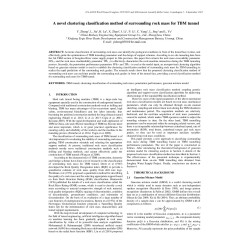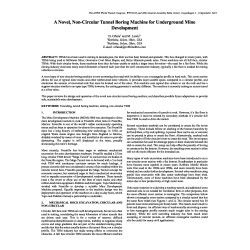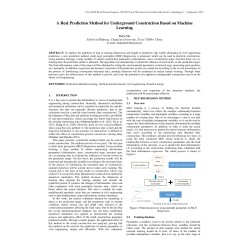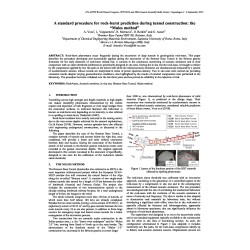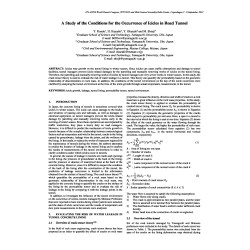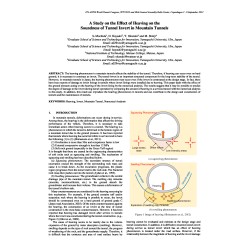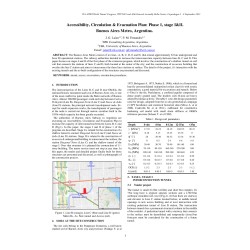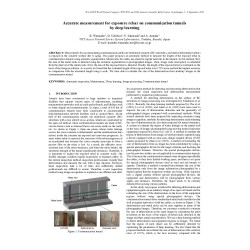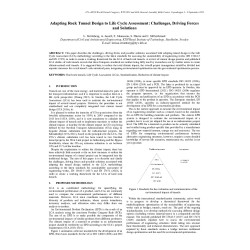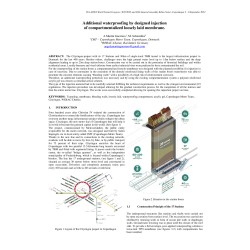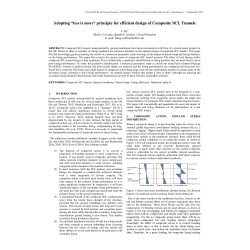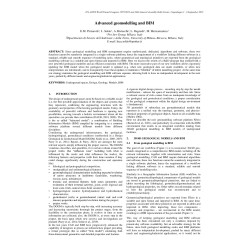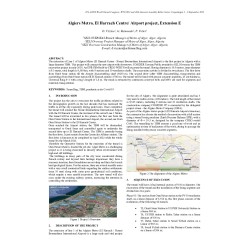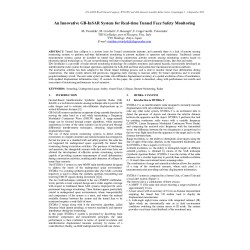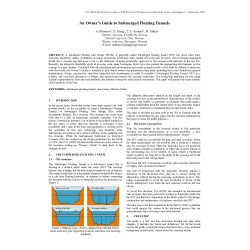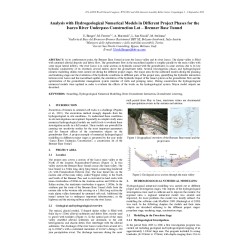No document
Search & filter
Search for a publication
Search & filter
World Tunnelling Congress
WTCThere are 1984 documents.
-
A novel clustering classification method of surrounding rock mass for TBM tunnel
Abstract: Accurate classification of surrounding rock mass can identify the geological conditions in front of the tunnel face in time, and effectively guide the optimization of TBM tunneling parameters and the design of support schemes. According to on-site tunneling data from the 3rd TBM section of Songhua River water supply project in Jilin province, this paper first extracts the rock mass excavability...
0,00 € -
A Novel, Non-Circular Tunnel Boring Machine for Underground Mine Development
Abstract: TBMs have been used in mining in decades past, but their use has been limited and sporadic. This has changed in recent years, with TBMs being used at Stillwater Mine, Grosvenor Coal Mine Slopes, and Sirius Minerals potash mine. These machines are all full face, circular TBMs. With their circular bores, these machines have thus far been unable to tackle a larger issue for mines—the need for a...
0,00 € -
A Real Prediction Method for Underground Construction Based on Machine
Abstract: To address the problems of lack in training dimensions and length of prediction step widely abounding in civil engineering prediction, a new prediction method, multi-layer perception (MLP)-Regression, is proposed, which can be used in practical construction. Using machine learning, a large number of similar construction parameters (deformation, stress, construction stage, structure form, etc.)...
0,00 € -
A standard procedure for rock-burst prediction during tunnel construction the Mules method
Abstract: Rock-burst phenomena occur frequently during the excavation of deep tunnels in good-quality rock-mass. This paper describes the procedure developed and successfully applied during the excavation of the Brenner Base Tunnel in the Brixner granite formation for the early detection of rock-burst related risk. It consists in the continuous monitoring of acoustic emissions and in their comparison...
0,00 € -
A Study of the Conditions for the Occurrenceof Icicles in Road Tunnel
Abstract: Icicles may growth on the tunnel lining in winter season. Since icicles can cause traffic obstructions and damage to tunnel facilities, tunnel managers prevent icicle-related damages by the patrolling and manually removing works of icicles on the tunnel lining. Therefore, the patrolling and manually removing works of icicles by tunnel managers are very severe works in winter season. In this...
0,00 € -
A Study on the Effect of Heaving on the Soundness of Tunnel Invert in Mountain Tunnels
Abstract: The heaving phenomenon in mountain tunnels affects the stability of the tunnel. Therefore, if heaving can occur even on hard ground, it is necessary to construct an invert. The tunnel-invert is an important structural component for the long-term stability of the tunnel. However, in mountain tunnels in Japan, the heaving phenomenon may occur even if the invert is constructed at the design stage....
0,00 € -
Accessibility, Circulation and Evacuation Plan Phase 1
Abstract: The Buenos Aires Metro consist of six lines -A, B, C, D, E and H- that extend approximately 63 km underground and have 90 operational stations. The subway authorities decided to increase the interconnection capacity between lines B, C and D. This paper focuses on stages I and II of the first phase of the extension program, which involve: the construction of a shallow tunnel on soft soil that...
0,00 € -
Accurate measurement for exposure rebar on communication tunnelsby deep learning
Abstract: Many tunnels for accommodating communication cables are reinforced concrete (RC) structures, and steel reinforcement (rebar) is exposed in the concrete surface due to aging. This paper proposes an automatic method to measure the length of the exposed rebar in communication tunnels using semantic segmentation. Metal racks for cables are placed at regular intervals in the tunnels. In this method,...
0,00 € -
Adapting Rock Tunnel Design to Life Cycle Assessment Challenges, Driving Forces
Abstract: This paper describes the challenges, driving forces and possible solutions associated with adapting tunnel design to the Life Cycle Assessment (LCA) methodology according to the latest standards for assessing the sustainability of engineering works (EN 15643-5 and EN 17472) in order to create a working framework for the LCA of hard rock tunnels. A review of current design practice and published...
0,00 € -
Additional waterproofing by designed injection
Abstract: The Cityringen-project with its 17 Stations and 30km of single-track TBM tunnel is the largest infrastructure project in Denmark for the last 400 years. Besides others, challenges were the high ground water level up to 1.0m below surface and the deep alignment leading to up to 25m deep station boxes. Construction was to be carried out in the proximity of historical buildings and within...
0,00 € -
Adopting less is more principle for efficient design of Composite SCL Tunnels
Abstract: Composite SCL tunnels waterproofed by sprayed membrane have been constructed in stiff clay for several major projects in the UK. However, there is currently no design guidance nor reference literature on the optimal design of composite SCL tunnels. This paper fills this knowledge gap by presenting the results of a numerical parametric study focusing on the impact of tunnel shape and lining...
0,00 € -
Advanced geomodelling and BIM
Abstract: Since geological modelling and BIM management require sophisticated, dedicated, algorithms and software, these two functions cannot be seamlessly integrated in a single software platform, hence the requirement of a workflow linking different software in a standard, reliable and smooth sequence of modelling tasks, where geometrical and topological primitives are exported from the geological...
0,00 € -
Algiers Metro, El Harrach Centre Airport project, Extension E
Abstract: ABSTRACT: The extension of Line 1 of Algiers Metro (El Harrach Center - Houari Boumediene International Airport) is the first project in Algeria with a large diameter TBM. This project will connect the new airport with downtown. COSIDER Travaux Public awarded to SELI Overseas the TBM excavation project in early 2018. An EPB TBM built by CREG-WIRTH will excavate the tunnel. Boring diameter is...
0,00 € -
An Innovative GB-InSAR System for Real -time Tunnel Face Safety Monitoring
Abstract: Tunnel face collapse is a serious issue for Tunnel construction industry, and currently there is a lack of remote sensing monitoring systems to perform real‐time deformation monitoring to prevent incidents to operators and machinery. Traditional contact measurement systems cannot be installed on tunnel face during construction activity; remote sensing monitoring systems based on...
0,00 € -
An Owner’s Guide to Submerged Floating Tunnels
Abstract: A submerged floating tube bridge (SFTB), or generally called Submerged floating tunnel (SFT) has never been built. However, feasibility studies of different crossings around the world have been carried out in the past 40 years. The Norwegian Høgsfjord SFTB was a concept that had gone so far to the milestone of being technically approved by the national road authority in the last 90s. Recently,...
0,00 € -
Analysis with Hydrogeological Numerical Models in Different Project Phases
Abstract: At its southernmost point, the Brenner Base Tunnel crosses the Isarco valley and its river Isarco. The alpine valley is filled with saturated alluvial deposits and debris flow. The groundwater flow in the unconfined aquifer is roughly parallel to the main valley with some major lateral inflows. The river Isarco is in some sections in hydraulic contact with the groundwater, in some sections due...
0,00 €

